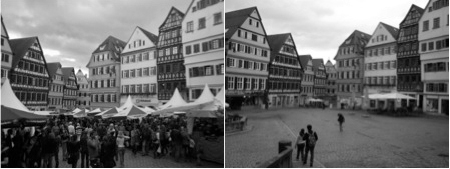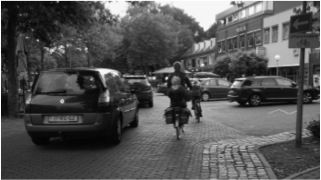Written by:
By Steven Tolson
Travelling by bike will help your health and make better places
People make Places
Students of place making will know about Jane Jacobs and Jan Gehl’s propositions that people make places. However, the debate in place making tends to be focussed on the physical entity but the reality is that buildings and spaces are inanimate and it is people who provide the activity of life giving place its spirit and value. People are place assets as well as buildings and spaces.
Contrast the following pictures of Tubingen Old Town taken at a recent food festival to see how a space becomes vibrant through the activity of people enjoying a festival of food.

Good places have always been where people congregate, interact and pass through. Being in a good place is a dynamic and energising experience which contributes to our sense of wellbeing and productivity. The health benefits of such positive emotions are well known.
Having argued that people are the heartbeat of a good place, success will depend on people’s preferences, motivations and values. In the UK we are conditioned by comfort, convenience and familiarity. It is our default position to automatically jump in a car to buy food from the supermarket (the “convenience store”). While this condition is largely influenced from a USA approach to wellbeing, it is less prevalent in Holland and Germany.
To find out more I recently undertook a cycling tour of Germany and Holland which illustrated well how the bicycle is the transport of choice for many people and the impact is not just about being a greener form of mobility, but it is about the social impact that cycling can have on places and people. Whether it is shopping, taking kids to school or simply socialising, Dutch and Germans of all ages are conditioned to using bicycles. The interesting thing is that while we love our motor cars, the Germans have the ability to get on their bike just as much as being in their Mercedes. So why can’t we achieve a greater balance?
British cycling has enjoyed enormous success in the last 10 years and as a result bike sales have increased dramatically. But such sales relate more to road bikes and lycra than bikes for suits and skirts. Scottish Government has a strategy for achieving 10% of all journeys by bike by 2020 which is a fivefold increase in today’s activity. How will such an ambition be achieved?
Germany saw the success of cycling in Holland and emulated this with a significant commitment to cycling infrastructure. This is not about carving up an existing pathway with bike lanes in the gutters which stop abruptly leaving cyclists unexpectedly in the traffic stream. Greater intervention is required by creating safe and pleasant separate routes, secure provision for bike parking and generating connections such as an ability to transport the bikes on trains.
A few years ago Scotrail won an innovation award for increasing their bike carrying capacity on the Highland line from 2 bikes to 4 but the average regional German train will carry 24 bikes which is invariably exceeded without any officious regulator throwing people off the train.

While cycling through German and Dutch towns I was aware that their town centres are more buoyant than ours. I wondered to what extent this was down to small shops and other amenities in centres being more accessible by bike? Certainly bikes can be brought virtually to the front door and parked free which is exactly the same convenient circumstance as a car at the supermarket.
In order to make places that work we need to get more people into the spaces such as town centres and other community hubs. This means safer and secure environments for cyclists who can feel at ease in populating such places which will increase sociability and personal exercise. People might argue that there are more hills in Scotland than Holland but electronic bikes will flatten out the gradients and they appear to be very popular in Germany.
So Scottish Government please match your ambition by a real investment commitment in cycling facilities and infrastructure. It will make our places better, our people healthier and tick big boxes for climate change. If we don’t invest we will continue to use the car for all of our conveniences.
Steven Tolson is a Chartered Surveyor (of Steven Tolson Consulting), Vice Chairman of the RICS Scotland Board and Chair of the RICS Scotland Regeneration Forum and plays an active collaborative role with Scottish Government and Local Authorities.
